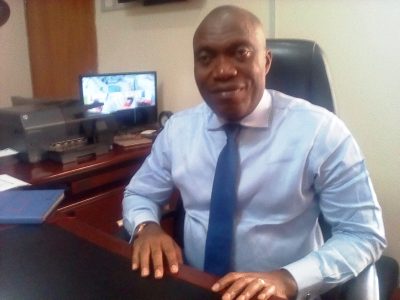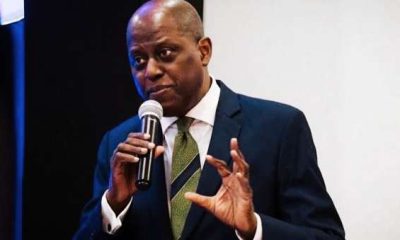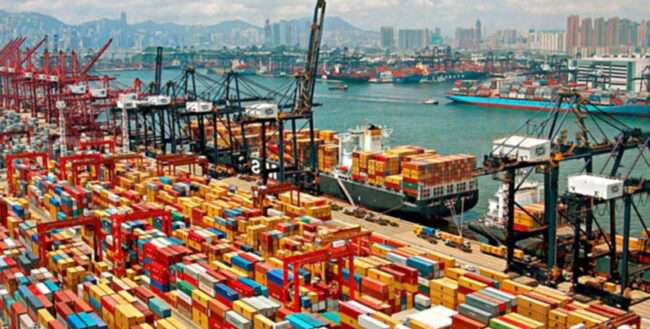Business
Stock market won’t repeat 2017 performance this year- Johnson Chukwu

The management of the Nigerian Stock Exchange (NSE) recently carried out reforms of the system to enhance the efficiency and effectiveness of the stock trading platform ; Johnson Chukwu, Managing Director of Cowry Asset Management Company Ltd, a major market trader, x-rays some of the reforms and reveals factors that may impact both positively and negatively on the equities and foreign exchange markets as the country approaches the 2019 general election. In an interview with Business Hallmark’s correspondent, FELIX OLOYEDE, Chukwu insists that the market may have to pull off a Harry Houdini-like magic trick to repeat the 46 per cent market yield of the previous year, 2017. Excerpts:
The Par value review and new pricing methodology of The Nigerian Stock Exchange (NSE) has been running for almost two months. What impact have the reforms had on the market?
Although the assessment period can be considered to be rather short, nevertheless, if we are to use what has happened in the past few weeks since they were implemented about two months ago, you would notice that some stocks are trading below a par value of 50 kobo per share, meaning that the market has correctly priced them in. You will also notice that some of the stocks that are trading below 50 kobo are gaining higher traded volumes. That to me shows that at the 50 kobo par value, they were actually priced above their intrinsic worth. Now that they have been corrected to their intrinsic worth people are interested in buying. It has created opportunity for people to take strategic positions in some of these companies and provide opportunities for turnarounds, if the weakness was due to ownership structure or management.
We seen large volume movements based on sound market criteria. For me, the impact is quite positive because the highly capitalized stocks will require lower volume to move them and the lower capitalized stocks will require higher volume to move them. So, you don’t just move market price when there is really no sufficient volume to justify it. On average, I will say so far, so good.
Oil price has improved significantly from what it was in 2016. But oil and gas stocks in the Nigerian capital market have not responded correspondently. What is the issue here?
You have to look at the segment of the oil and gas that is listed in the stock market. Apart from Seplat, all listed oil and gas companies are in the downstream segment. The downstream operators in the country are going through a lot of difficulties. For the upstream operator like Seplat, we observe that its result for 2017 was superb and the stock has appreciated significantly in line with this development in the upstream sector, which include favourable crude oil price and luckily for us, we have also seen improved production volumes. For the upstream market in which Seplat is listed, the market has responded favourably to the sectors fundamentals. And for the downstream sector, which is where most listed companies operate, we have seen several hiccups. We have seen supply challenges, where availability of products across the country has been an issue, which ordinarily affects the volume of business. We also know that the market is regulated, which does not allow market operators to optimize capacity. The downstream sector has been going through a lot of difficulties and this could explain why stock prices in this market segment have not rallied strongly.
The upstream sector is completely disconnected from the downstream sector in Nigeria, because operators here do not operate across the value-chain. There is no company that is producing, refining and marketing in the country unlike elsewhere in the world.
There have been different reactions to the decision of the CBN to bar banks with high NPLs and low capital adequacy ratio from paying dividends. What is your position on this?
It is just in line with prudential guidelines. What the Central Bank is doing is to conserve cash and encourage banks whose non-performing loans are high to ensure continued solvency. In this way the banks have been compelled to increase their reserves and cushion the effect of their non-performing loans. For me, it is a prudential measure to forestall further deterioration of liquidity of banks that already have high NPLs. You know that high non-performing loans could lead to a liquidity crisis, which could lead to insolvency. So, if you stop banks with high NPLs from paying dividends, it compels them to conserve cash and rebuild their reserves. Remember that what is not paid out as dividend is preserved as retained earnings in the company.
Does this decision take into cognizance the interest of investors?
An equity investor is ultimately the butt of poor banking operations. If the bank is doing well they gain from it. If it is doing badly, they lose. And if the bank fails, they are the last to be paid out. So, when a bank is having non-performing loan issues and it is beginning to affect its liquidity and possibly solvency, the equity shareholders cannot be divorced from the pains associated with the failure of the company. Anybody who is an investor in a bank, he or she must be conscious of how the bank is run, they should be part of the annual general meeting, and should be involved in the election of directors. Possibly, the investor should be involved in the election of members of the audit committee such that they would compel the management of the bank who are their agents to run the bank efficiently and effectively. If a bank fails, the ultimate losers are the shareholders.So, there’s no decision that will be taken on the bank that would insulate the shareholders. It is either they gain from it or they suffer from it.
Our foreign reserve has been rising and it recently reached a five year high. There is an argument that it is just for academic purposes. How does it benefit ordinary Nigerians?
When you have a high foreign reserve, it bolsters the confidence of investors, particularly foreign investors, because they know there is liquidity for exit from the stock market if they make that decision. Today, we hardly talk about FOREX scarcity. We have relative stability in the exchange rate. The country’s exchange rate has a direct impact on inflation rate. Improved FX stability has direct impact on economic activities. Of course, we saw in the last quarter of 2017 that some of the sectors that were starved of FX are beginning to recover.
We saw the trade sector turn positive; we saw the manufacturing sector turn positive. Some other sectors are benefiting from the fact that we have more FX available in the economy than we had in 2016. These are facts that are not academic. If the reserves are just $20 billion, we are going to go back to the situation where we have multiple exchange rates and trouble with the lack of liquidity in the FX market. It would affect the level of economic activities and it could lead to a recession.
By how much do you think the forthcoming elections would affect the stock market?
One would not know the magnitude of how the market would react to elevated risks associated with political activities, but certainly the market will adjust to it. Every market would adjust to a national election because the number of unknowns and risks. There is the unknown factor of who will win the election. There are unknown factors of a change of government policies, even if an incumbent government would return. There are unknown factors of who the government would appoint as key economic managers and their economic orientation. These are facts that every market would react to ahead of an election. A lot of people will pull back and put their investments in safer assets and watch. I am talking about even domestic investors. For foreign investors, many would want to exit and watch as the elections are held.
There have been a lull in the bond market. This is an area financial institutions made a kill last year. For instance, Zenith Bank revenue from T-Bills was up by over 450 per cent. With government cutting down its borrowing in the local market, where do you think banks would making money this year?
This year we should see banks other incomes, particularly FX related income- royalty commission, Form M commission and other income related to trade facilitation rising significantly. The simple truth is that there has been improved FX liquidity. FX will be available to traders who want to open letters of credit, pay commissions, maintenance fees and carry out other transactions. So, I expect that as banks lower their sights from the fixed income market, they are likely to focus on providing transaction services, which would include trade financing, because in trade finance there are several revenue streams that a bank can enjoy.
When banks facilitate trade, the first beneficiary is the trade sector. And in this sector are importers and exporters. But beyond that, because there is improved FX liquidity, manufacturers would also have access to FX to import raw materials and equipment. From this perspective one would say the real sector would benefit. Remember that interest rate is still high. I expect that not until interest rates come down to single digit, the real sector would continue to borrow at the current rate. Even as the real sector recovers this year, we may not expect a lot of buoyancy until interest rates moderate further.
Do you see the CBN adjust rates downward?
The Central Bank Governor has already alluded to that. The governor, Godwin Emefiele, did say if inflation slows to a certain threshold, the Monetary Policy Committee would consider reviewing the Monetary Policy Rate. And I understand the Senate has accepted to screen members of the Monetary Policy Committee and deputy governors of the Central Bank. We are dealing with an inflation rate that has dropped to about 14.3 per cent. Should that moderate below 13 per cent, the Central Bank may see a compelling need to reduce benchmark rate below 14 per cent.
Last year, the stock market grew by about 46 per cent. What is your outlook for this year?
Because this year is an election year, at some point as we approach the election, investors will begin to sit on the fence. I do not expect to repeat the performance of last year. But I expect that the market would return in positive, all things being equal.
You think fintechs pose any danger to commercial banks?
Fintechs would nibble away at some of the banking sectors services. A lot of retail sservices can now be automated and provided by technology companies. To that extent, banks may not completely lose their core function of lending, but the process of creating credit products may be taken up by technology companies. A lot of the services that banks currently provide may be taken over by technology companies. Banks should know that some of their services would be better provided by technology companies. In effect, they pose some threat to the banking industry, but it is not a mortal wound to bank market presence. Fintechs can only chew at some of the services, but I don’t see it leading to the death of the banking industry.
The Economic Recovery and Growth Plan (ERGP) has been launched more than a year ago, what is your assessment of its performance so far?
As it stands now, I only know of one area we have achieved some reasonable milestone. That is the ease of doing business. Beyond that, I am not aware that we have made any reasonable progress in trying to achieve our targets. The government said they want to create 15 million jobs. I have heard the government talking about creating 7 million jobs in the agricultural sector. But I find it difficult to relate with this figure. The government said it wants to produce 10,000 MW, we are still distributing about 3,600MW. The government said we want to be net exporters of refined petroleum product. I am not aware of any government refinery that is working. I doubt if Dangote Refinery would be ready by the time that government is stipulating that we will be net exporters of petroleum product. Of the numerous milestones that are contained in the Economic Recovery and Growth Plan, one is finding it difficult to see any traction, other than in the easing of doing business index, where Nigeria jumped 24 places.I have always advocated that they break these things into measurable milestones, which was what the minister for Trade and Investment did recently. So, we can measure what we have to achieve.
If you would take a bet on the Naira, how much do you think the Naira will close in 2018?
As we get closer to election days, the Naira would come under pressure. We should expect naturally that some foreign portfolio investors would exit. Exiting would mean they would make large demands on our reserves, which would have some effect on the value of the Naira. Secondly, there is huge demand for dollar cash during election cycles. I expect that demand for dollar cash will put so much pressure on that segment of the market that the spread will open up again. Naira would have to give up some of the gains it has achieved as election approaches.
So like how much to you think the Naira would end up exchanging against the dollar?
It is difficult to say. It would depend on whether we are going to have smooth electioneering and free and fair election. If we do, the depreciation we will see will be immaterial. But should the polity be heated up we should get to a point that the outcome of the election will not be accepted by the people or it will not be the representation of the wish of the people, then we may see the spread become very wide, because a lot of people would want to take a dollar position out of fear and uncertainty.











